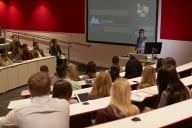You have /5 articles left.
Sign up for a free account or log in.
Aspiring English instructors were supposed to be mastering their craft in the teacher education class Francesca Forzani observed.
Forzani, a former English teacher, looked on in horror as the students spent an entire semester debating what a high school reading list should look like. More contemporary or classical literature? Perhaps multicultural books?
“They never practiced anything as simple as introducing students to a text,” said Forzani, who observed the class as part of an auditing process.
Forzani, who helped revamp the University of Michigan’s teacher education curriculum, is now the associate director of TeachingWorks. The new university-led program aims to develop the first set of widely used national standards for producing competent new teachers, something many training programs now fail to do.
More than 60 percent of teachers say they’re unprepared for their first jobs, according to the U.S. Department of Education.
That’s little wonder for Forzani when she recalls watching that class for aspiring English teachers (which was not at Michigan). While the nation’s teacher educators do a fine job discussing issues facing education and the theories behind teaching, Forzani said, there is far too little practical work.
Many elementary school teachers don’t learn how to lead a lesson on fractions. English teachers arrive in a classroom without knowledge of Romeo and Juliet or Julius Caesar, mainstays of almost every school’s curriculum. Deborah Ball, dean of Michigan's School of Education and director of TeachingWorks, said the idea that teachers can learn on the job is outdated and dangerous.
"People think teaching is an easy thing," Ball said. "People haven’t tended to think kids are as at risk when teachers are underprepared."
But it if a pilot or surgeon were trained without any set of national guidelines, Ball said, people would worry.
TeachingWorks has the support of the American Association of Colleges for Teacher Education and the National Council for Accreditation of Teacher Education. The leaders of both organizations expressed optimism that Michigan's work could benefit new teachers and perhaps become a national standard.
The idea behind TeachingWorks is to bring education in line with other professions by stressing basic but important occupational goals that current teacher education standards often gloss over. Tasks like leading a classroom discussion, crafting small-group projects and conferencing with parents are on the TeachingWorks list. Michigan leaders will compile resources that teacher educators can use to emphasize those issues and 16 similar ones.
One reason for the theoretical nature of many training programs is that standards vary from state to state. But the goal of TeachingWorks is to highlight traits that every good teacher needs, whether the fourth-grade math class they’re leading is in Tacoma or Tampa.
“These are not things that state expectations get in the way of,” Forzani said. “These are things that people have got to be able to do.”
The initiative grew out of a multiyear effort to improve Michigan’s own teacher education program. But with most new teachers leaving college unprepared for their careers and the looming exodus of retirement-age baby boomers, Forzani said that the urgent need to produce more good young educators calls for a wider reach. Forzani hopes TeachingWorks also bridges the gap between traditional teacher training programs at universities and alternatives like Teach for America, which places top college graduates in all fields in underachieving schools.
With no perfect or easy solutions for teacher education, Forzani said it only makes sense for Michigan to share its knowledge while drawing on the expertise of other teacher training programs. “For too long, we have known there has been a problem with teacher education in our country,” U.S. Secretary of Education Arne Duncan said in taped remarks at the unveiling of the system. “I couldn’t be happier that the University of Michigan is making this commitment to raise the bar for teacher preparation.”
TeachingWorks is in the process of hiring subject experts in math and English, which will allow the organization to develop more material for teacher educators. In the meantime, Michigan is hosting a series of presentations by leading teaching educators that it streams online.
Upwards of 100 people from around the country have tuned in, signaling to Forzani that people are open to new ideas. While doctors and plumbers all follow a series of nationally accepted standards, Forzani said that remains a dire need for teacher training programs.
“It became clear to us that we needed some infrastructure in the field professionally to work on these things,” she said. “I don’t think it’s particularly hard if we could just get clear as a profession what we expect a new teacher to do.”








